UK-US Seal £31 Billion Tech Pact to Cement AI, Quantum & Nuclear Ties
By Tredu.com • 9/17/2025
Tredu

Microsoft, Nvidia, Google and more pledge heavy investment under new “Tech Prosperity Deal” as Trump visits UK
Britain and the United States have agreed to a £31 billion (~$42 billion) technology pact during President Donald Trump’s state visit, aiming to deepen cooperation in artificial intelligence, quantum computing, and civil nuclear energy. U.S. tech leaders including Microsoft, Nvidia, Google, and Amazon Web Services are key players in the “Tech Prosperity Deal”, making investments across cloud infrastructure, supercomputing, and large-scale AI commitments.
What the Deal Includes
- Microsoft is pledging approximately £22 billion to build out AI and cloud infrastructure, including the UK’s next supercomputer based in Loughton.
- Nvidia will deploy 120,000 GPUs across UK sites, accelerating its European footprint.
- Google is investing £5 billion, including a new data centre and expanding AI research through DeepMind.
- Other major firms involved include CoreWeave, Oracle, Amazon Web Services, and Salesforce, with projects spanning clean energy, AI growth zones, and quantum computing.
Why It Matters: Market Implications
- Tech & Infrastructure Stocks: Firms supplying hardware, servers, cloud services, and energy infrastructure in the UK are likely to benefit. Microsoft, Nvidia, and data-centre operators will be under particular focus for gains.
- Electric Grid & Energy Pricing: The scale of these data centres and AI infrastructure projects places new demands on electricity supply. UK energy markets may face upward pressure in demand peaks and could impact costs for utilities and consumers.
- Regulatory Landscape: The UK appears to favor a lighter regulatory approach (e.g. on AI, data governance) in this deal, aligning more with U.S. norms than EU-style regulation. That may attract more investment but also raise concerns over oversight.
- Global Competition: The pact underscores the UK’s ambition to be an AI and tech leader. In a world where China is advancing rapidly in AI and quantum tech, this deal aims to help the UK and its U.S. partners compete.
Risks & What to Watch
- Delays in permitting, planning, and environmental approvals for data centres and infrastructure could slow project delivery.
- Energy constraints: If clean energy capacity or grid upgrades do not keep pace, projects could run into operational cost or sustainability headwinds.
- Regulatory backlash: EU regulators or domestic bodies concerned about data privacy, competition, or digital taxes may push for stricter controls.
- Geopolitical risk: Tech dependencies and trade tensions (especially around semiconductors or export controls) could impact supply lines and project costs.
In summary, the UK-US $42 billion “Tech Prosperity Deal” is more than symbolic, it’s a major bet on AI, quantum computing, and clean tech infrastructure. The pact has potential to reshape economic growth, investment flows, and technology leadership. The core theme: deep bilateral tech investment underpins both strategy and competition in the modern global economy.

How to Trade Like a Pro
Unlock the secrets of professional trading with our comprehensive guide. Discover proven strategies, risk management techniques, and market insights that will help you navigate the financial markets confidently and successfully.


